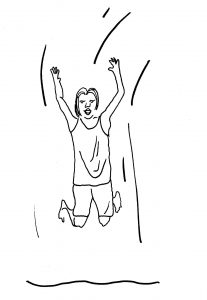Verbal pronominal prefixes: the start of verbs

Verbs
Mawng verbs always comprise of three parts: a prefix, root and a suffix. For example, the verb ki-mi-n ‘he says’ has a prefix ki-, a root -mi and a suffix -n. The prefix tells us who is doing the action. In this case, ki- is the third person Masculine form, so we know it is one male who is doing the action. The root -mi means ‘say’, and the suffix -n tells us that this is the non-past form of the verb. The optional k in the prefix ki specifies that the verb is in the present tense.
Verbs that talk about one person or one group of people, such as kimin ‘he says’, are intransitive verbs. A full list of prefixes for Mawng intransitive verbs is given in the table below.
Hover over the green text to see explanations of grammatical shorthand.
| Gloss | Non-future | Future | |
| 1sg | me | nga- | ngana- |
| 1pl.in | us (including you) | (k)arr(k)- | arrkpa(na)- or atpa(na)- |
| 1pl.ex | us (but not you) | ngarrK- | ngatpa(na)- |
| 2sg | you (one person) | (k)an(ng)- | anpa(na)- |
| 2pl | you (two or more people) | kurr- | kutpa(na)- |
| 3MA | he | (k)i- | iwa(na)- |
| 3FE | she | (k)iny- | inypa(na)- |
| 3LL | it | (k)ang- | angpa(na)- |
| 3VE | it | (ka)ma- | mana- |
| 3ED | it | (k)aK- | apa(na)- |
| 3pl | they | (k)awu- | awa(na)- |
The optional (k) at the start of each prefix is used for the present tense form, which is the form listed in the dictionary. The element (na) is found in the longer form future tense prefixes that occur with one syllable roots (e.g., inypana-mi-n ‘she will say’).
Transitive or ditransitive verbs talk about an action in which a person (or group) is doing something to another person (or group). These verbs take the transitive verb prefixes shown in the table found at this link – Transitive Verb Prefixes.
To use this table, look up the subject features in the leftmost column and the object features in the top row. For example, the prefix kini-, which is found in the verb kini-ma ‘he gets it’, has a third person Masculine gender subject (3MA) and third person Masculine gender object (3MA). Most Mawng verb roots start with a consonant. But if a verb root starts with a vowel, the prefixes that it takes are a little different. For example, instead of kini- it will have kinny- and instead of kani- it will have kanny-. Note the abbreviations ‘fut’ (future tense) and NP (non-past tense). The non-past form is used for both present and future tense.
Verb suffixes: the endings of verbs
Verbs suffixes tell you whether something happened recently or might happen tomorrow, much the same way that verbs in English can indicate when it is taking place. For example;

I jumped out of the way.
I am jumping over rocks.
I jump every day.
I will jump into the water.
Mawng verbs can be grouped into 20 classes that predict what verb suffixes they will take. In each verb dictionary entry, you will see a number after the part of speech. This number is the class number of the verb (shown in the table below). Verbs that do not fit neatly into one class have ‘IRR‘ (irregular) or ‘nk‘ (not known) instead of a number. In this table, if a verb form has no ending or a zero ending, this is indicated with the symbol ø.
Mawng verb conjugation classes
| Class number | Example | Non-past | Past punctual | Past continuous | Irrealis 1 | Irrealis 2 |
| 1 | kilangali | -ø | -ngan | -ng | -ng | -nga |
| 2 | kimaju | -ø | -ngan | -ng | -ng | -nyi |
| 3 | kimin | -n | -ny | -nang | -ø | -na |
| 4 | kinikpi | -ø | -ung | -ang | -ng | -(y)a |
| 5 | kinilarkpungku | -ø | -ny | -ang | -y | -a |
| 6 | kinilartpan | -n | -n(t)iny | -ntung | -nyjing | -nti |
| 7 | kinilati | -ø | -ny | -jang | -ng | -ja |
| 8 | kiniluntu | -ø | -ny | -ngung | -y | -nyi |
| 9 | kinima | -ø | -ny | -ngung | -y ~ -ng | -nyi |
| 10 | kininyji | -ø | -ung | -ang ~ ‑angung | -ng ~ -ung | -a |
| 11 | kiniwanpani | -ø | -ny | -nyang | -ng | -nya |
| 12 | kiniwun | -n | -ng | -ning | -ø | -ni |
| 13 | kiniwunya | -ø | -n | -ngung ~ ‑ntung | -y | -ø ~ -nti |
| 14 | kiniwuta | -ø | -iny | -ngung | -y | -nyi |
| 15 | kiniyarlkanyi | -ø | -ny | -ang | -ng | -a |
| 16 | kinnyatpi | -ø | -ung | -ang | -ng | -(y)a |
| 17 | kinnyayan | -n | -wng | -ntung | -nyjing | -nti |
| 18 | kinnyuki | -ø | -jiny ~ ‑ny | -ang | -ng | -(y)a |
| 19 | kinnyutpa | -ø | -n | -ngung | -y | -nyi |
| 20 | kiyarni | -ø | -ngan ~ ‑liny | -ng | -ng | -nga |
© Dictionary compliation, Ruth Singer and Warruwi Community 2021. Mawng speakers own the Mawng language. They also own their knowledge of plants, animals, kinship, Mawng country, customs and history which is compiled in this dictionary.
© Dictionary compliation, Ruth Singer and Warruwi Community 2021. Mawng speakers own the Mawng language. They also own their knowledge of plants, animals, kinship, Mawng country, customs and history which is compiled in this dictionary.
